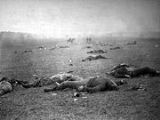
between organized groups within the same nation state or republic
, or, less commonly, between two countries created from a formerly-united nation state.
The aim of one side may be to take control of the country or a region, to achieve independence for a region, or to change government policies.
The term is a calque of the Latin bellum civile which was used to refer to the various civil wars of the Roman Republic
in the 1st century BC.
A civil war is a high-intensity conflict, often involving regular armed forces
, that is sustained, organized and large-scale.
1157 The Battle of Grathe Heath ends the civil war in Denmark. King Sweyn III is killed and Valdemar I restores the country.
1383 The 1383-1385 Crisis in Portugal: King Fernando dies without a male heir to the Portuguese throne, sparking a period of civil war and disorder.
1570 The assassination of regent James Stewart, 1st Earl of Moray throws Scotland into civil war.
1850 Senator Daniel Webster gives his "Seventh of March" speech endorsing the Compromise of 1850 in order to prevent a possible civil war.
1992 The Rome General Peace Accords ends a 16 year civil war in Mozambique.
1994 The Angolan government and UNITA rebels sign the Lusaka Protocol in Zambia, ending 19 years of civil war (localized fighting resumes the next year).
1997 After a brief civil war which has driven President Pascal Lissouba out of Brazzaville, Denis Sassou-Nguesso proclaims himself the President of the Republic of the Congo.

